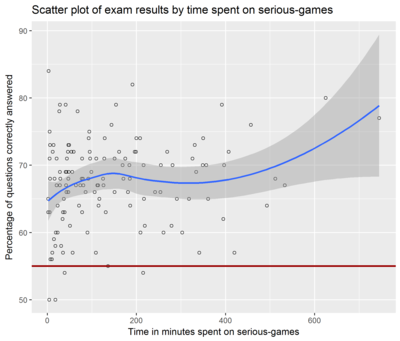Poster3 - 01: IMPACT OF SERIOUS GAMING ON TESTING IN PRE-GRADUATE SURGICAL EDUCATION
P M Bloemendaal, MD, J A Hage, van der, Prof, M T Koning, Bsc, K A Bartlema, Drs; LUMC
Problem: The clinical surgery clerkship at the Leiden University is preceded by a two-week preparation period. Part of this period consists of levering the surgical knowledge from the past, needed for the clinical stage. This period is concluded by a summative multiple-choice exam with 100 questions.
To guide students while studying and measure their improvements in surgical knowledge, we offer equivalent multiple-choice questions in the form of serious gaming. The database from which these questions were pulled, overlaps less than 10% with the summative test’s database. Since all serious gaming efforts are logged, time spent on serious gaming has been recorded for every pre-graduate student.
Method: To test the correlation between the amount of time spent on serious gaming and outcome of the summative test, we performed a retrospective study correlating exam results with the use of serious gaming.
The level of knowledge was measured by our digital exam software EGEL, while the use of the games (times started and total time) was measured by our learning management system (LMS) MedicalEducation.nl. The data was processed and analyzed with R, a language and environment for Statistical Computing. A total of 135 students were included in this study.
Results

The correlation between time spent on games and exam results was measured at 0.176, while the correlation of number of times students started a serious-game with the exam results was calculated at 0.193.
Although the correlation of time spent on serious games and exam results is inconclusive, a scatterplot with regression line visually suggests a trend for a positive effect of using games, with a maximum effect on 140 minutes. More time spent in serious games results in a lower exam rates. This effect, while not statistically significant, contradicts a potential positive correlation.
Conclusions: Serious gaming alone cannot predict outcome of the summative pre-graduate surgery exam. Confounding factors might be the fact that students may try to compensate lack of formal study time by extensive serious gaming. Therefore, serious gaming may facilitate learning but is definitely not a substitute for formal teaching.
